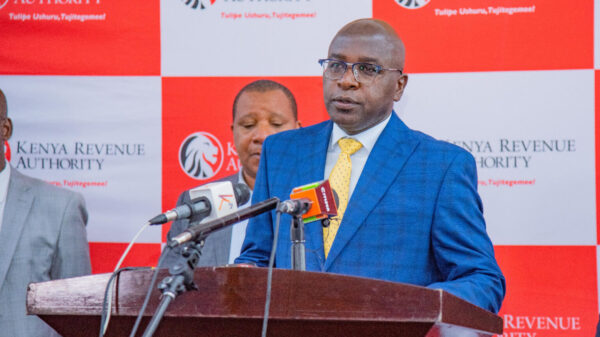
In its 2018 Sustainability Report, Safaricom reported a 128 per cent increase in solar use through its initiative dubbed M-KOPA with those subscribed to it projected to save up to $ 450 over the next four years/FILE
JOHANNESBURG, South Africa, Nov 9 – Safaricom Plc has for long been the vanguard of Kenya’s economic growth. Having won a distinction as the driving force of East Africa’s economic hub, Safaricom is seeking another pre-eminence – detaching itself from carbon footprint.
The firm, controlling 67 per cent of Kenya’s telecommunications market share and accounting for 6.5 per cent of the nation’s $ 75 billion Gross Domestic Product (GDP), has announced an ambitious target to eliminate carbon emissions arising from its operations by 2050.
In measures geared towards actualizing its de-carbonization plan, Safaricom has already shifted a number of network sites to renewable energy sources with latest estimates putting the number of sites powered by carbon-free energy at 155.
The company which reported emissions of 63,685 tCO2e in its 2018 Financial Review is planning to sustain the momentum by progressively shifting its remaining 4,700 network sites to a carbon-free power grid.
Despite recording a decline in fuel consumption by 2 per cent, Safaricom still faces an uphill task – that of reducing its fuel consumption from the current 9.4 million litres to nil in the next 32 years.
The realization of carbon-free power is not just good for the environment. Safaricom stands a chance to save $467.49 monthly in power bills for each of its 4,700 network sites currently connected to the national energy whose consumption was reported at 141,500 MWh.
However, it is worth noting that the company has made significant progress in promoting the use of renewable energy at household levels by advancing soft asset loans through which over 1.2 million homes have been connected to solar power.
In its 2018 Sustainability Report, Safaricom reported a 128 per cent increase in solar use through its initiative dubbed M-KOPA with those subscribed to it projected to save up to $ 450 over the next four years.
M-KOPA subscribers will enjoy at least 75 million hours of kerosene-free lighting further reducing carbon emissions.
Safaricom has also adopted initiatives geared towards conserving water, as well e-waste management.
Under these initiatives, Safaricom’s water usage declined five per cent to stand at 91,449 m3 with an impressive 97 per cent rate of recycling and reusing of waste generated within the business.
Over seven million single-use carrier bags have since been replaced with reusable eco-friendly bags.
“The introduction of our internal ‘zero waste to landfill’ programme, is already ensuring that 97 per cent of the waste generated within our administrative buildings in Nairobi is recycled or reused,” Safaricom Chief Executive Officer, Bob Collymore noted pointing out a 16.5 per cent increase in renewable power usage.
The e-waste programme has since inception in 2013 seen 855 tonnes of electronic waste collected further complementing Safaricom’s replacement of single-use plastic bags at retail outlets.
The mobile service provider is also determined to assert its dominance in Kenya’s economy that has seen it accumulate a solid base of 26.9 million subscribers out of which 20.5 million are registered on mobile money transfer. Each of these listed customers is estimated to make an average of 11 transactions every month.
In its 2018 Sustainability Business Report, Safaricom reported $1.9 billion social impact from the mobile money transfer business popularly known as M-PESA.
Collymore identified social transformation as the firm’s central theme in its pursuit for sustainability affirming the firm’s commitment to delivering relevant products and services to customers as well as enhancing operational excellence.
“By running a sustainable business, we seek to contribute towards improving the quality of life of every Kenyan. We also seek to contribute to sustainable living throughout Kenya and are committed to managing our operations in a responsible and ethical manner,” he underscored.
But what is the future of the company in the face of intense competition and the quest to sustain profitability? Will Safaricom meet its sustainability ambitions for economic empowerment, gender parity among its workforce?
Safaricom’s 5,556 workers is one of the most balanced as far as gender representation is concerned. The company’s executive board for instance boasts of a 70:30 male to female ratio with a target to attain a 50:50 ratio by 2020.
A closer look at the telecommunications giant also shows that 1.7 per cent of its workforce are physically disabled, commonly referred to with the institution as differently-abled.
The company has a target of increasing the number of physically disabled persons working for it to 5 per cent by 2020.
This target is not only critical to economic empowerment of the physically disabled estimated to be about 10 per cent (4.4 million) of Kenya’s population but also a challenge to other corporate entities to adopt a similar approach.
The bid blends well can also give impetus to Article 54 (2) of the Constitution which requires the State to progressively ensure at least five per cent of elective and appointive positions are reserved for persons with disabilities.
Cumulatively, Safaricom has sustained 171,369 direct jobs among them 156,000 mobile money transfer agents who earn commission by processing M-PESA deposits and withdrawals.
A 2018 Klynveld Peat Marwick Goerdeler (KPMG) True Value Case Study put total job opportunities, including direct, arising from Safaricom’s investment at 897,372 creating a total economic value of $ 543 million, nearly 9.8 times the value creation report in the 2017 Financial Year.
On the social front, Safaricom has rolled out an Unstructured Supplementary Service Data (USSD) that affords over 2.8 million learners and 40,000 teachers nationwide an opportunity to access a web-based education platform dubbed Shupavu 291.
In a bid to promote good governance and combat graft, Safaricom has implemented a radical zero-tolerance policy in addition to risk assessment for departments susceptible to corruption.
The 2018 Financial Review reported 43 dismissals after 57 fraud cases were examined out of which ten warning were issued.
The company however needs to adopt stringent monitoring mechanisms given an upward trend in fraud cases. The number of cases in the 2017 review for instance was reported at 33, having increased from 31 and 29 in years 2016, and 2015.
Safaricom dismissed 52, 16, 58 staff in 2017, 2016, and 2015 respectively following investigations into fraud claims.


































